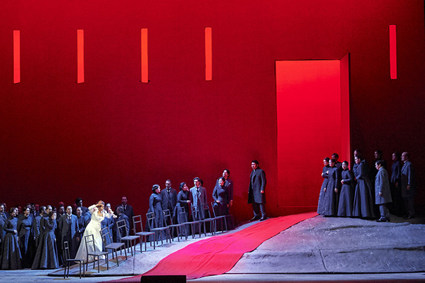| Opera Reviews | 24 April 2024 |
Vocal intensity warms up this chilly new Luciaby Moore Parker |
|
| Donizetti: Lucia di Lammermoor
Vienna State Opera 12 February 2019 |
|

Olga Peretyatko (Lucia), Ensemble
|
|
|
Donizetti’s masterpiece has historically enjoyed great popularity, as well as a vital association with the Austrian capital. Just less than two years after its 1835 world premiere in Naples, Vienna presented the work (ahead of Paris and London) and its appeal has remained a constant - with significant stellar events here including Toscanini’s guest visit with La Scala in 1929, Callas’ legendary appearances with von Karajan in 1956, and the springboard showing in 1978 which propelled Edita Gruberova to international stardom. And so to the new production by Laurent Pelly (a co-production with Opera Philadelphia) with sets by Chantal Thomas, who also cooperated in the La Fille de régiment production which has graced London and New York, in addition to Vienna. According to reports this current concept was inspired by Jean Epsteins 1928 film of the House of Usher, and indeed the snow-clad Lammermuir slopes and diffusely-lit (Duane Schuler) castle, the stiffly-draped greys and browns of the period costumes, and the chillingly-isolated characters, blanket the entirety in a sad and eerie atmosphere. The indoor scenes maintain the hill-like elevation - while firstly adding overpowering and privacy-depriving glass structures for the opening of Act II, dark backdrops for the fatal wedding, and a blood-red ceiling-to-floor wall with matching runner which extends from Lucia’s imaginary apartments down the hill to the prompter’s box for the Mad Scene. An echo in some respects of the Fille mechanics - but less appropriate here. This particular performance evidently far outshone the damp squib premiere, with television cameras on this occasion possibly prompting attempts at the customarily interpolated top notes (which had initially been negated by conductor Evelino Pidò in his reworked notation for the title character), and with a general sense of intensity prevailing among the cast. Allegedly much consideration was given to possible elements in the stage characters' personalities and motives with, however, really only the title role unfolding as a detailed (if at times illogical and obscure) creation. Appearing quite psychotic in her opening scene, this Lucia oddly acquired remarkable stability throughout the emotional stress of the ensuing scenes with her brother, and her undesired nuptials - to abruptly capitulate into a manic state for her ultimate unhingement. Olga Peretyatko (known here for her Gilda, Elvira, Adina and Violetta) was granted her first Vienna premiere in a role that she had already undertaken in Tokyo and New York. On a positive note, her stage deportment and acting ability greatly underscore an appealingly pure soprano which is, however, just adequate in dimension for this challenge. The deficits lie not only in a soft-grained mid-range and tenuous top notes - but more seriously, with a perfunctory technical facility to deliver the character’s essential scale-work and trills with perfect ease. Significantly, the voice (despite its physical shortcomings) is imposing in presence and ultimately, the soprano’s lyricism and fluidity of tone gelled with the aforementioned assets to nail a success. For the record, Peretyatko stretched to high Eb (albeit gingerly) to close the Mad Scene on this evening. Juan Diego Flórez’ relationship with the house dates back to 1999 - with this being his fifth new production at the State Opera, and with the role of Edgardo already in his repertoire (Barcelona and Munich). However, (in keeping with Peretyatko) the casting was also modest in terms of sheer vocal weight and corresponding dynamic range, resulting in a taxing overload of brittle overtones and a sense of physical effort for much of the task to hand. Nevertheless, Edgardo’s heart-wrenching "Fra poco a me ricovero" (where the orchestration is particularly favourable) rang true in emotional impact and ranked as one of the evening’s highlights. George Petean was essentially the most likely vocal candidate among this current line-up - with an Enrico, incidentally, which dates back in the house to 2009. If a touch lacking in personality, his portrayal was proficiently sung and stylistically flawless. The remaining soloists were drawn from the house ensemble - all new to their roles. Lukhanyo Moyake showed a promising lyric tenor as an uncomfortably-rigid Arturo, while Virginie Verrez’ frustratedly-tested handmaid, Alisa, boasted a fruity-toned mezzo of distinct potential, in addition to Leonardo Navarro’s crisply-defined Normanno. Jongmin Park’s Raimondo boomed somewhat stolidly in the role’s upper tessitura, while lacking both the depths and italianità of a true basso cantante to classify as ideally suited. In fine form, the chorus was restricted to claustrophobic groupings and effectively-stifled to-and-fro choreography, in an icy setting wherein even matrimony could draw little joy. Following research of Donizetti's and other historic manuscripts, Evelino Pidò chose to open some of the score’s traditional cuts, in addition to a re-arranged cadenza for Lucia’s Mad Scene (atmospherically augmented by a glass harmonica - which was regarded as early as the late 18th century as potentially having mind-altering effects - and which Donizetti intentionally chose for the scene). At the final curtain, an admiring lady in one of the proscenium boxes threw a generously-sized bouquet intended for Juan Diego Flórez as he took his call. The flowers landed at Petean’s feet, who - after much flustered action by the fan - presented Flórez the token on bended knee! Kisses all round, and - in a lovely gesture - after Peretyatko had completed her bows, Flórez himself kneeled before his Lucia and gallantly passed on his flowers to her.
|
|
| Text ©
Moore Parker Photo © Wiener Staatsoper / Michael Pöhn |
|







